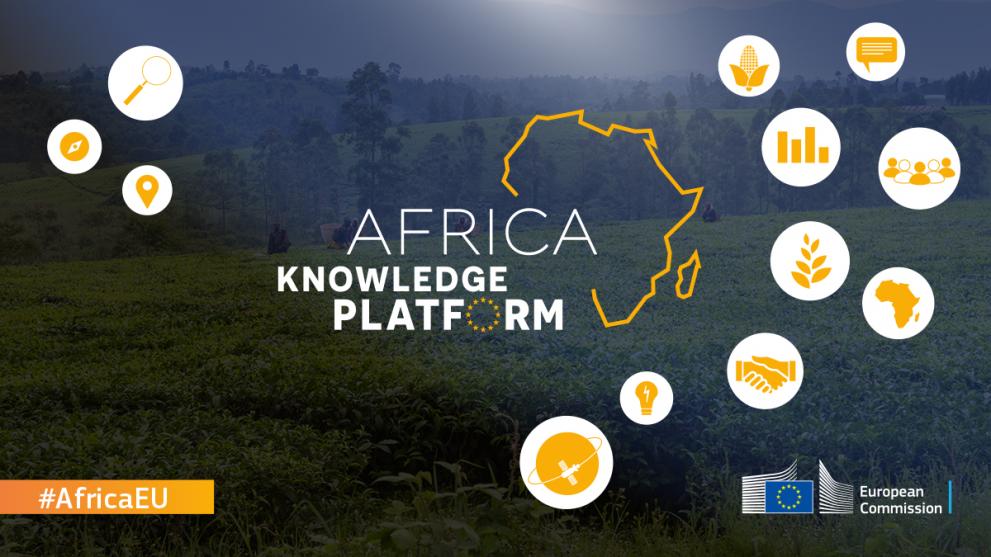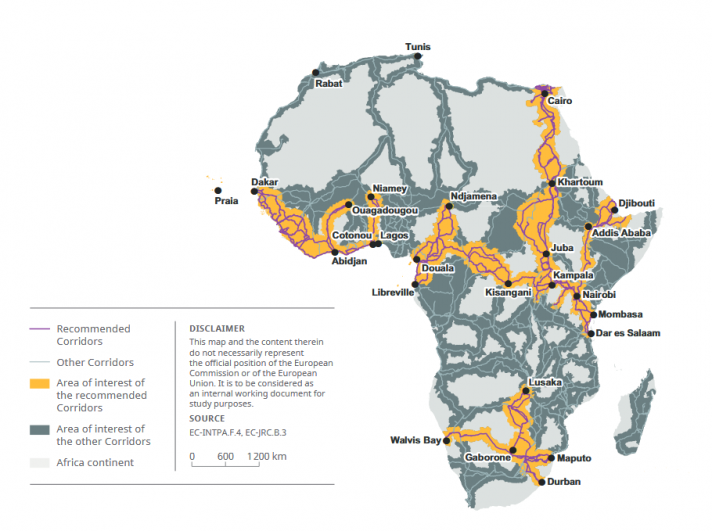
The JRC has unveiled a new online gateway to decades’ worth of data, tools, partners and success stories on Africa. The Africa Knowledge Platform provides easy, open access to the latest available information.
The Platform was presented ahead of last week’s EU-African Union Summit, right after the launch of the ‘Global Gateway Africa – Europe Investment Package’, with more than €150 billion of funding for strategic investments.
Working together with African partners, the package aims to accelerate the green and digital transitions, support sustainable growth and decent job creation, strengthen health systems and improve education and training.
Science has a key role to play: when deciding what investments to prioritise, and how, it is important to have access to up to date, reliable knowledge and information. Scientific partnerships are also a good vehicle for co-designing sustainable territorial development and they can help establish common ground for evidence-based decision making.
The Platform covers the full spectrum of JRC work on Africa. Topics range from natural resources to nuclear safety and security, food value chains to satellite observations and climate services, and from sanitation to remittances. It includes interactive tools like the ecosystems explorer, the clean energy access tool, and the wildfire information system. Visitors can create their own maps, from a local scale right up to the level of the whole continent, on various themes.
The Global Gateway investment package will be delivered through ‘Team Europe’ initiatives: the EU, its Member States and European financial institutions will collaborate to support concrete and transformational projects jointly identified in priority areas.
The Africa Knowledge Platform can help Team Europe to capitalise on existing knowledge, access the latest information, and discover good practices. The Platform is a one-stop shop for anyone with a direct interest in cooperation between the EU and African countries and institutions, including African and European stakeholders from the public and private sectors.
Strategic corridors and energy investments
One major aim of the investment package is to support the creation of strategic, sustainable and secure transport corridors in Africa. By investing in the infrastructure needed to easily move from place to place, these ‘strategic corridors’ can support value chains, services and jobs, benefiting industries in both Africa and Europe.
JRC experts worked closely with the Commission’s department for international partnerships (DG INTPA) to develop a specialised methodology that characterises and ranks these strategic corridors in Africa.
By employing more than 140 quantitative indicators, the experts identified 55 strategic corridors along four policy scenarios: Strengthening Europe-Africa connectivity; Human development & peace and security; Green Deal; and Sustainable growth and jobs.
From that 55, a shortlist of 11 strategic corridors were recommended: four in West Africa, two in Central, two in East and two in Southern Africa, as well as one in North-East Africa. The shortlist was obtained by analysing potential trade-offs along the four scenarios, for 32 indicators such as economic welfare, equity, social inclusion, impact on the environment or impact on vulnerable groups.
The strategic corridors will help to guide infrastructures projects that will be financed by the EU´s Neighbourhood, Development and International Cooperation Instrument (NDICI) as part of the Team Europe approach.
The methodology was presented and discussed with stakeholders and private investors last week at the 7th EU-Africa Business Forum. The 11 recommended corridors were unveiled at the EU-African Union Summit by French President Emmanuel Macron and European Commission President Ursula von der Leyen.
The JRC also presented a new solar energy investment index at the same Forum. 650 million people in Africa have no access to electricity. Although the continent has a huge untapped renewable energy potential, there is a lack of investment in renewable energy systems. The PV Decentralised Energy Investment (PV-DESI) Index is designed to help inform renewable energy investment in Africa. The Index uses 52 indicators along four main dimensions:
- Financial indicators showing whether funding possibilities in a country are favourable;
- Political indicators showing if the political situation is stable;
- Environmental indicators showing the potential for exploiting local renewable energy resources such as solar mini-grids, and minimising CO2 emissions.
- Social indicators showing whether investments can bring socio-economic impact. For example, electrification can bring greater relative benefits to areas with higher levels of poverty.
Background
The JRC’s work on Africa contributes to the Commission priority ‘a stronger Europe in the world’, which aims at reinforcing the EU’s responsible global leadership. A strong, fair and open trade agenda makes Europe an attractive partner. This is key to strengthening the EU’s role while ensuring the highest standards of climate, environmental and labour protections.
The EU-AU Summits take place traditionally every three years, alternating between Africa and Europe. Last week's Summit was initially scheduled in 2020, but was postponed due to the COVID-19 pandemic. It brought together a string of leaders. The Commission representation was led by President von der Leyen and High Representative/Vice-President Borrell, whilst the President of the European Council Charles Michel and the Chairperson of the African Union and President of Senegal Macky Sall co-chaired the event.
The first ever Africa-Europe Week (where the Africa Knowledge Platform was presented) took place in the margins of the Summit. Between 14 and 18 February, close to 30,000 online participants and 100 onsite speakers representing youth, civil society, local authorities, private sector and cultural actors focused on 'cross-continent people-to-people relations', with the view to strengthen Africa-EU partnerships.
Sources
Details
- Publication date
- 25 February 2022
- Author
- Joint Research Centre

